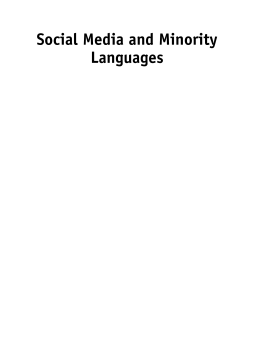
Additional Information
Book Details
Abstract
As a field in its own right, Minority Language Media studies is developing fast. The recent technological and social developments that have accelerated media convergence and opened new ways of access and exchange into spaces formerly controlled by media institutions, offer new opportunities, challenges and dangers to minority languages, and especially to their already established media institutions. This book includes debates on what convergence and participation actually mean, a series of case studies of specific social media developments in minority language, as well as comparative studies on how the cultural industries have engaged with the new possibilities brought about by media convergence. Finally, the book also offers a historical review of the development of Minority Language Media worldwide, and evidences the areas in which more extensive research is required.
The importance of the internet in efforts to promote minority languages is often asserted but still too poorly understood. This excellent collection is a major step in addressing this gap. Providing a rich mix of theoretical material and finely-grained case studies, it deepens our understanding of the complex relationship between social media – and other media – and policy and planning for minority languages.
Elin Haf Gruffydd Jones is Senior Lecturer in Media and Creative Industries and Director of the Mercator Institute for Media, Languages and Culture at the Department of Theatre, Film and Television Studies at Aberystwyth University. She has been working in the field of Minority Language Media Studies for over twenty years and has published widely on matters of language and media.
Enrique Uribe-Jongbloed is an assistant professor at the Faculty of Communication at Universidad de La Sabana, and the director of the Audiovisual Culture research group. He has been involved in various Minority Language Media studies endeavours since he joined the Mercator Media Network in 2007.
This collection is explicative and multilayered...and will appeal beyond MLM studies to linguistic disciplines, although an appreciation of the situation of minority languages is presupposed in the range of studies presented. Insightful and accessible, it will interest established and emerging minoritylanguage researchers and activists who are concerned with the complex relationship between language and the new media environment.
Sarah McMonagle, University of Hamburg, Germany
The book will be very useful to applied linguists and sociolinguists, students and scholars alike, interested in the role of today’s multilingual, multi-platform media in minority and Indigenous language communities; to media specialists in academia and in the media industry; and to anyone interested in examining the role of digital age media in maintaining language diversity.
Table of Contents
| Section Title | Page | Action | Price |
|---|---|---|---|
| Title Page | iii | ||
| Copyright | iv | ||
| Contents | v | ||
| Contributors | viii | ||
| Preface | xi | ||
| Introduction: Ethnic/Linguistic Minority Media – What their History Reveals, How Scholars have Studied them and What We might Ask Next | 1 | ||
| Part 1 Theoretical Debates on Convergence and Minority Languages | 29 | ||
| 1 Minority Languages Media Studies and Communication for Social Change: Dialogue between Europe and Latin America | 31 | ||
| 2 Towards Ethnolinguistic Identity Gratifi cations | 47 | ||
| 3 Minority Language Media, Convergence Culture and the Indices of Linguistic Vitality | 58 | ||
| Part 2: Web 2.0, Social Networking Sites and Minority Languages | 73 | ||
| 4 Investigating the Differential Use of Welsh in Young Speakers’ Social Networks: A Comparison of Communication in Face-to-Face Settings, in Electronic Texts and on Social Networking Sites | 75 | ||
| 5 Luxembourgish on Facebook: Language Ideologies and Writing Strategies | 87 | ||
| 6 Audience Design and Communication Accommodation Theory: Use of Twitter by Welsh – English Biliterates | 99 | ||
| 7 Kashubian and Modern Media: The Infl uence of New Technologies on Endangered Languages | 119 | ||
| 8 The Welsh Language on YouTube: Initial Observations | 130 | ||
| 9 Learning Communities Mediated through Technology: Pedagogic Opportunities for Minority Languages | 146 | ||
| 10 Enhancing Linguistic Diversity through Collaborative Translation: TraduXio, an Open Source Platform for Multilingual Workfl ow Management in Media | 159 | ||
| 11 Experiences of Audience Interaction by BBC Network Radio Producers: Implications for Endangered Language Media | 173 | ||
| Part 3: Media Convergence and Creative Industries | 185 | ||
| 12 Towards a Template for a Linguistic Policy for Minority Language Broadcasters | 187 | ||
| 13 Legislating the Language of Cinema: Developments in Catalonia | 202 | ||
| 14 The Contribution of BBC ALBA to Gaelic: A Social and Economic Review | 212 | ||
| 15 Multilingual Practice of the EITB Group and its TV Provision for Teenagers | 224 | ||
| 16 Tell a Song/Waiata Mai/Abair Amhrán: Singing Out | 237 | ||
| 17 Languages: Obstacles and Brand Values in the Age of Media Convergence | 246 | ||
| Concluding Remarks: Towards an Understanding of Media Impact on Minority Language Use | 255 | ||
| Index | 266 |
